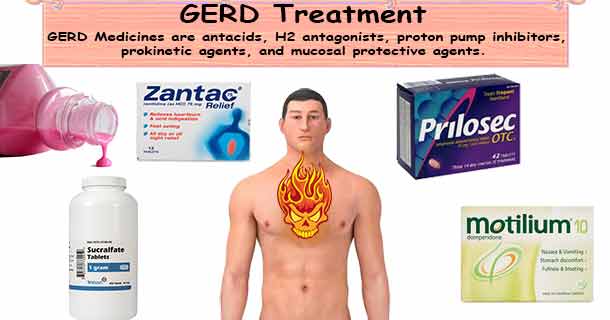Treatment for GERD are lifestyle change, medications, natural treatments and surgery. The most popular among them are over the counter GERD drugs.
GERD Medications
There are several medications available for the GERD treatment, most of them are acid neutralizing, available over-the-counter and does not require prescription.
Antacids
Antacids are acid buffering drugs that can neutralizes stomach acid, this include Alka-Seltzer, Mylanta, Maalox, Tums, Rolaids, Riopan, and Gaviscon, are the first drugs used to relieve heartburn and other mild GERD symptoms.
The liquid forms of these drugs work faster; however, tablet forms are convenient to carry. These medicines just neutralize the stomach acid thus work for a short duration and do not heal the esophageal inflammation. Antacids use different combinations of three basic salts of magnesium, calcium, and aluminum with hydroxide or bicarbonate ions to neutralize the stomach acid.
Antacids can have side effects; magnesium salt may cause diarrhea, and aluminum salt may cause constipation. Aluminum and magnesium salts often combined in a single product to balance these effects.
Calcium carbonate antacids, such as Tums, Titralac, and Alka-2, can also supplement calcium. They can cause constipation. Foaming agents, such as Gaviscon, work by covering stomach contents with foam gel to prevent reflux.
H2 antagonists
H2 antagonists or H2 blockers are drugs that causes the stomach to make less acid, this include famotidine (Pepcid AC), cimetidine (Tagamet), nizatidine (Axid), and ranitidine (Zantac). This drug is effective for patients with mild to moderate GERD symptoms. They are available in prescription strength and over-the-counter strength. These drugs provide short-term relief and effective for about half of the people with GERD symptoms.
They suppress the normal secretion of acid by parietal cells and the meal-stimulated secretion of acid. Therefore, other substances that promote acid secretion (such as gastrin and acetylcholine) have a reduced effect on parietal cells when the H2 receptors are blocked.
Proton pump inhibitors
Proton pump inhibitors (PPI) are drugs that shut down the stomach acid production, this include esomeprazole (Nexium), omeprazole (Prilosec and Zegerid), lansoprazole (Prevacid), pantoprazole (Protonix) and rabeprazole (Aciphex). These drugs are more potent and takes longer to begin effect. PPIs are for more severe GERD symptoms. PPI drugs Prilosec OTC and Zegerid OTC are now available over-the-counter.
Prokinetic agents
Prokinetic agents (Motility drugs) are the backbone of treatment for acid reflux GERD along with acid suppression medications. This drug enhances the emptying of the stomach and/or gut and enhance the contractions/co-ordination of the gut. It help the stomach to empty faster, which decreases the amount of time during which reflux can occur.
Prokinetic drugs available in market are Cisapride, Domperidone (Motilium), Metoclopromide (Reglan, Maxeran), Levosulpiride (Levobren, Levopraid), Erythromycin (low dosages, not antibiotic dosing levels), Tegaserod (Zelnorm, Zelmac), Mosapride Citrate (Gasmotin), Itopride hydrochloride (Ganaton), and Pruclopride (Resolor). Prilosec is also available in over-the counter strength.
Prokinetics have frequent side effects such as fatigue, sleepiness, depression, anxiety, and problems with physical movement that limit their usefulness.
Mucosal protective agents
The mucosal protective agent protects the mucosal lining of the stomach from acidic gastric juices by making a coat, soothe and protective coating. This class of drug include sucralfate (Carafate), misoprostol (Cytotec), antacids (Mylanta, Maalox), and bismuth subsalicylate (Pepto-Bismol).
In acidic solution, it forms a viscous, tenacious paste that binds selectively to ulcers or erosions for up to six hours. Thus, do not take this drug along with H2 blockers or antacids that lower acidity, which is must for this drug to do its job.
Harmful effects of GERD Medication
Acid reducing drugs neutralizes stomach acid, which provide favorable environment for parasitic bacteria to colonize the stomach and overgrow in the small intestine. This affects digestion and proper absorption of vitamins, minerals and nutrients, thus leads to deficiency. This makes the problem further worse and affecting production of stomach acid and levels of bile secretion needed for proper digestion.
Optimal stomach acid secretion kills bacteria, thus intestinal bacteria cannot reach esophagus, lungs and sinuses. However, when acid blocking drugs are used, bacteria can survive and surpass stomach. People on acid-blocking medications are prone to respiratory infections from bacteria, entered through the intestine.
According to a study in the Journal of the American Medical Association (JAMA), the long-term use of PPIs can lead to weakened bones and fractures. Calcium absorption is effective only when the stomach is acidic. The authors suggested that the increased risk of fracture might be due to PPIs interfering with calcium metabolism.
In March 2011, the FDA informed the public (see FDA.gov web site) that taking prescription PPI drugs or for extended periods (mostly over one year) could cause low serum magnesium levels (hypomagnesemia). This deficiency in magnesium blood levels can have number of symptoms including muscle cramps, involuntary movements, cardiac arrhythmia, hypertension, and central nervous system problems including irritability, confusion, hallucinations, depression and seizures.
What will happen if GERD left untreated?
Untreated GERD can permanently damage the esophagus. Prolonged exposure to stomach’s acid content can cause the esophagus to become inflamed, narrow, or develop an open sore. This further complicates the condition leads to chronic coughs, Barrett’s Esophagus, and even esophagus cancer.

